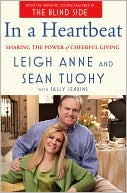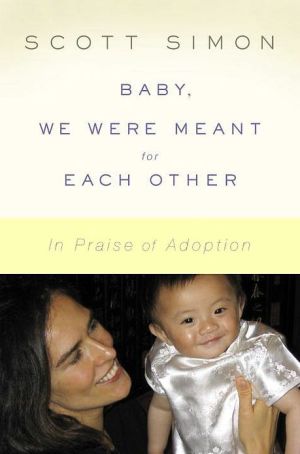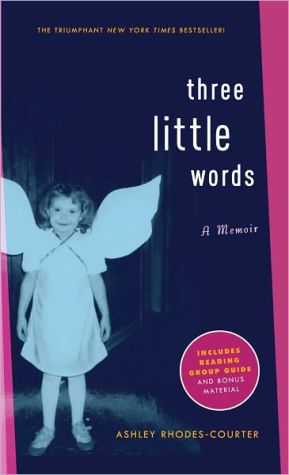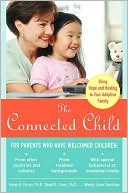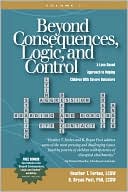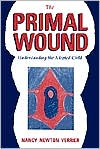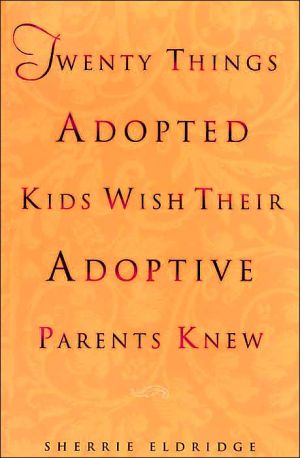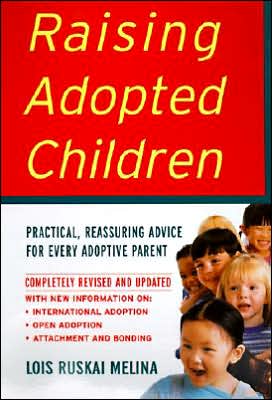What I Want My Adopted Child To Know
What I Want My Adopted Child to Know: An Adoptive Parent's Perspective is a tender, revealing look at adoption from the parent perspective. Whether you are an adoptive parent, an adoptee, someone considering adoption, or simply curious about adoption dynamics, What I Want My Adopted Child to Know: An Adoptive Parent's Perspective will touch your heart and increase your sensitivity to the challenges and joys that are unique to adoptive parenting.\ Bacchetta wrote the book in response to a need...
Search in google:
What I Want My Adopted Child to Know: An Adoptive Parent's Perspective is a tender, revealing look at adoption from the parent perspective. Whether you are an adoptive parent, an adoptee, someone considering adoption, or simply curious about adoption dynamics, What I Want My Adopted Child to Know: An Adoptive Parent's Perspective will touch your heart and increase your sensitivity to the challenges and joys that are unique to adoptive parenting.Bacchetta wrote the book in response to a need common among adoptive families. "Adoptive families navigate emotional terrain that fully-biological families don't have to. This is a book adoptive parents can give to their child and say, 'I know adoption is painful, unsettling, joyous, and affirming. It's that way for me too. More than anything, adoption is the way we came together, and I'll always be grateful for that.'"Bacchetta's words echo with the collective voice of over 100 adoptive parents interviewed for this book. With chapters like "I Would Do it All Again", "You Are Not Different Because You Were Adopted," and "I Regret What I Can't Give You," What I Want My Adopted Child to Know is by turns affirming, challenging, thoughtful, wistful, and poignant.
What I Want My Adopted Child to Know\ An Adoptive Parent's Perspective \ \ By Sally Bacchetta \ iUniverse, Inc.\ Copyright © 2010 Sally Bacchetta\ All right reserved.\ ISBN: 978-1-4401-9436-8 \ \ \ Chapter One\ I Would Do It All Again \ When I look back over my shoulder at the path I took to adoption, I wonder how close I came to living a different life altogether. I wonder which of the roads not taken would have made all the difference. What if your father and I had met earlier than we did? What if we had gone further with ART (assisted reproductive technology)? Would I have biological children if I had given up caffeine? What about the meatless diet, the kickboxing, and the fall from a ceiling beam in the barn? Did any of that affect my ability to conceive?\ I reflect on every fork and detour and I wonder: If I had been able to conceive and carry a child, would I have adopted you anyway? I'll never know, but I like to think so. I like to think we were destined to be together. I like to think that by God's plan or some cosmic choreography, all roads led to you. I like to think that no matter which direction I traveled, I would end up here. With you. There's no way to know for sure, and I guess it doesn't really matter anyway, because here we are, officially "us." And I would do it all again.\ You know your birth story; I've told it to you many times. That is, I've given you what details I know of the who, the when, and the where of your coming into the world. I've also told you about our coming together. You know how happy I was the first time I held you. You know who was there and what everyone said. You've seen the first pictures of us together, and you know the story of your homecoming. But there's another chapter in your birth story, a chapter that's not so much about you. It's my chapter. You see, your birth story is also my birth story, because the mother I am was born when you were born. You made me a mother. You made me your mother. And for me, our birth story actually began long before you were born.\ I don't know anyone who dreamed of growing up, getting married, and not being able to have children. I certainly didn't. I assumed that when (if) I decided to have children, one of my perfectly ripe eggs would let her guard down for the most athletic of a throng of swimming suitors, and I would simply get pregnant as women in my family have done for generations. I would have children the regular way, if I decided to have them at all.\ I didn't think about adoption much, and when I did, it was as a really nice, slightly exotic thing to do. A really nice, slightly exotic thing for other people to do. Older couples who never had children, or people who wear sandals year-round and quit their jobs to become missionaries, or families who fix up old Victorian mansions and seem to collect assorted "children with special needs" or kids from "broken homes." Adoption was something those people did-not me. Why would I?\ I peed on a forest worth of tiny test strips before I started to think that maybe "it" wasn't going to happen-not without some help, anyway. So I climbed into the stirrups. I consulted the experts. I filled the prescriptions and charted my temperature and scheduled sex. I stood on my head right afterward and tried not to cough or sneeze the rest of the day. I got X-rays of my insides and injections in my backside. All of my once-private entrances and exits were transversed, transmographed, radiographed, photographed, sanitized, anesthetized, magnified, pulled and pried, palpated, saturated, dilated, inseminated, and evaluated in a series of attempts to get pregnant. And the harder I worked at it, the easier it seemed for other people to get pregnant.\ Every time I turned around, I bumped into another swelling belly-my younger sister, my older sister, my sister-in-law, my friends, my neighbors, my coworkers, your father's coworkers, my hairdresser, the bank teller, stray cats-and except for the cats, they all paraded around like they medaled at some reproductive Olympics, like they had "Competent Uterus" or "Fully-Functioning Female" stamped on their foreheads.\ It's not their fault they're fertile, I thought, so I forced my smile and offered congratulations. I gift-wrapped yet another Classic Pooh creeper from yet another baby registry ... and I hid in the closet with my empty uterus, crying so hard and so long I ran out of tears. I prayed for at least one viable egg and just a handful (is that really too much to ask?) of motile sperm, and for patience and grace and enough self-control that I didn't snap and smack the next bloat-bellied broad who chirped "I just love being pregnant!"\ I worked my way dutifully-and with increasing panic-through a rigid curriculum of specula, specimens, pillows, and pills, approaching my pre-prenatal calisthenics with religious fervor-injection, collection, inspection, rejection. Begin again. Injection, collection, inspection, rejection. Begin again. Until the day I didn't begin again. I just couldn't. It wasn't anything I planned or even decided, really (unlike the hundred self-imposed deadlines I had deliberately blown right past, pretending not to notice that I was a year, or two or three, beyond the last line I had drawn in the sand. If I'm not pregnant by the time I'm X age, I'm not going to try anymore. I don't want to be that mother). One day I just stopped trying. Something happened inside me or nothing happened, I don't remember. I just stopped.\ Some people move easily from the dream of having children to the dream of adopting them. They are more attached to the idea of raising children than they are to genealogy. Plan A didn't work; it's on to Plan B. No big deal. Others need time to grieve the losses of infertility before they can conceive of another way. Sadly, some people who want very much to adopt are weighed down by the prejudices of family members who think they can't bond beyond their bloodlines. And many of us never recognize our own quiet biases about adoption until it becomes intensely personal. That was me.\ I was angry. I was petulant. I was wounded. I was painfully surprised to find that I was a snob. It turned out that deep within my most private self, without meaning to, and never overtly, I thought of adoption as a default, a less than. Apparently, I thought of adoption as a last resort for people who were out of options, people who had failed to produce their own children, people who couldn't make a family the regular way, people who were desperate or broken. People like me.\ I didn't want to be people like me.\ I resented having to consider adoption. I resented my body for betraying me. I resented being wired to want kids. I rejected the notion of having children that weren't really mine. I disparaged pregnant teenagers for doing in the backseat what I couldn't do in the sanctity of my marriage. I was angry at your father for bringing home a book about adoption, and I was barely civil to the cavalcade of social workers, attorneys, and adoption agency staff who traipsed in to invade my privacy and whose file folders on my kitchen table were tangible proof of my fundamental inadequacy. I despised my need for them even as I desperately wanted their help.\ I cried and raged and judged and fumed and, after alongwhile, accepted. I accepted that things happen the way they happen. It is what it is. I accepted myself and my situation. I accepted that it wasn't really my situation at all; it was ours, your father's and mine. I accepted his perspective and his feelings and his help, and eventually, I realized that adoption is as natural for some people as pregnancy is for others. I accepted adoption as legitimate, as legitimate a way as any other of becoming a parent. Once I got my head and my heart around that, I began to embrace adoption as the right way for me to become a mother. I grew to cherish the idea and even feel special. Adoption emerged as something self-evident and fulfilling and romantic. I fell in love with the idea of adoption, and I began to bond with my child-to-be-adopted-later even before choosing an agency to work with.\ I was ready to adopt long before I was ready to tell other people I wanted to adopt. To say it out loud made adoption a scarlet "A," proclaiming my deficiency to the world. I no longer thought of infertility as a failure, or adoption as a defeat, but I was convinced that other people did. To tell it to someone else was to confirm their whispered speculation and make myself an object of their pity. I didn't want or need anyone's condolence. I had made my peace with adoption, and once I fell in love with my child-to-be, I developed the same fiercely protective streak that most parents have. I was sure that even if they didn't say it, other people would think of my child as a less than, a settled for, a "better than nothing." The idea of adopting my child had become better than anything to me, and I couldn't bear for anyone to think less of her or him.\ I thought that coming to terms with the idea of adoption would be the most difficult part of the process. Was I ever wrong! The time I spent deciding to adopt was a walk in the park compared to actually doing it. It turns out that adoption is a tremendous hassle. It's intrusive and time-consuming and expensive. Again and again we had to convince strangers that we were fit to parent, while every day brought another story of parents who left their babies alone in the car or served alcohol to underage teens.\ We got fingerprinted and evaluated, looked over and passed up. We gave strangers access to our financial records and our bedroom closets, knowing full well that plenty of biological parents were cruising along with stale batteries in their smoke detectors, pot handles facing out, and wall outlets uncovered.\ We spent over a year researching agencies, attending seminars and workshops, and filling out endless application forms. We talked to everyone we knew who had adopted. Did you go private or public? How did you do your networking? If I may ask, what costs were involved? How long did you have to wait? We became adoption experts, well-versed in private versus public, domestic versus international, open, closed, intrastate compacts; the Intercountry Adoption Act; and the Hague Convention. We learned the difference between surrender, relinquish, and termination of rights, and between adoption agencies and adoption facilitators. We deliberated about sibling groups, transracial adoption, and children with special needs. We compared the pros and cons of adopting domestically and from China, Russia, Guatemala, Chile, and the political climate of each.\ We talked to parents who had adopted through foster care, some of whom thought it was right for them and others who admitted they wouldn't do it again. One adoptive-from-foster-care mother said, "There's no way to prepare for the heartbreak of loving children who can't or won't ever really love you back." I was daunted by the prospect of trying to heal children who are old enough to understand that they have been rejected or abandoned, and whose hearts and spirits are often quite bruised. I was haunted by visions of children who are unable to attach, who withdraw, self-abuse, or act out aggressively against the parents who have waited a long time to love them. I know that's not the case with all children adopted from foster care, but still I wondered if I was prepared to take that risk. What kind of a person am I if I say no? Would I be the best choice for that child?\ Your father and I lay awake at night ruminating: What do we want? What can we handle? What will our families support? Should we adopt domestically? What will our life be like when this baby is a school-age child? A teen? Are we in a position to immerse our child in a culture different from ours? Is ongoing contact with the birth family beneficial or confusing for the child?\ We learned to live among stacks of paperwork-background checks, medical exams, child abuse clearance forms, blood tests, bank statements, dossiers, letters of reference, our personal portfolio, each precious referral and potential lead. We had breakfast with the ICC report, studied the CAP book during lunch, and went to bed each night with more questions than answers.\ Apparently, my inability to conceive implies a corollary potential inability to parent, at least to the people who can make or break an adoption. The first step toward proving our parental fitness was to complete a home study with an adoption social worker. Wanting to make a good impression, we bought carbon monoxide detectors and fireplace guards, we stuck Tot-Finder decals on the windows of your future nursery, and we even vacuumed behind the refrigerator. We cut the grass, washed the windows, put the coffee pot on, and reminded each other not to interrupt, tap our pens, laugh too loud, talk with food in our mouths, or swear. And for heaven's sake, agree with each other about everything!\ The home study interview questions, and there are many, seem easy at first:\ What age child do you hope to adopt? Would you consider a sibling group? In what religion, if any, do you plan to raise your child? Will there be a stay-at-home parent?\ As the interview goes on, the questions become more challenging:\ Are you open to a child of a different race? Would you consider a child whose birth mother had multiple sexual partners and whose birth father is unknown?\ Are you open to a child who has spent two or more years in foster care? Would you agree to visits with the birth mother three times a year?\ And finally, downright uncomfortable:\ Are you willing to accept a child born with one or more physical deformities? Would you consider a child conceived through rape? Would you consider a child conceived through incest? Are you open to a child whose birth parents are mentally retarded?\ As we answered "yes" or "no" to mental illness, history of attempted suicide, illegal drug use, alcoholism, cleft palate, asthma, cystic fibrosis, premature birth, smoking during pregnancy, dwarfism, exposure to HIV, I became more and more self-conscious. I felt violated, having to answer these questions while a social worker recorded our responses-a social worker whose impression of us mattered a great deal. The adoption process forced us to make public some of our most private biases and limitations, some of which we didn't even know we held.\ We finally received word that our paperwork had been processed and we were officially "active" or certified for consideration. Great news! OK, where's our baby/child/referral? We waited and waited and waited for someone to call and say that a birth mother wanted to meet us. For a long while, I leaped every time the phone rang. Maybe it's the agency! What if it's a birth mother? Has the baby been born yet? Is it a boy or a girl? Day after day the phone rang and it wasn't the agency or a birth mother. Day after day the babies being born weren't for us, and one day I didn't leap for the phone. I just walked. And after more days and more babies who weren't ours, I didn't even walk, I plodded. Plodding eventually gave way to just staying on the couch screening phone calls through the answering machine.\ The wait was absolutely agonizing. There were no OB/GYN appointments or baby showers to mark the time. No ultrasounds or heartbeats to suggest that our baby had in fact begun the journey to our arms. No one asked how I was feeling or if we'd chosen a name or "Hey, when's the big day?" When you're waiting to adopt, children don't ask adorable questions like "Did the baby crawl in there by himself, or did his daddy put him in?" or "Can the baby come out just for a minute so I can see it?" or "Doesn't it get tired of eating your mashed-up food?" Strangers don't offer unsolicited advice in the elevator or the checkout line or in public restrooms. As annoying and intrusive as strangers can be, I craved their interest as an affirmation that baby existed and parenthood was imminent. Adoption is like an invisible pregnancy, with nothing to suggest you're any closer to being a parent today than you were yesterday, or last week, or last month.\ Not being a member of the pregnancy sisterhood, I missed out on all the prenatal pampering and impromptu parenting advice from veteran mothers. And many people, when we told them we were hoping to adopt, simply didn't know what to say, so they said less and less over time, and eventually we had only the occasional support group meeting or phone call from a social worker to reassure us that Everything Happens The Way It's Supposed To. I was supposed to bear my own children. That's the way it was supposed to happen.\ (Continues...)\ \ \ \ \ Excerpted from What I Want My Adopted Child to Know by Sally Bacchetta Copyright © 2010 by Sally Bacchetta. Excerpted by permission.\ All rights reserved. No part of this excerpt may be reproduced or reprinted without permission in writing from the publisher.\ Excerpts are provided by Dial-A-Book Inc. solely for the personal use of visitors to this web site. \ \
Contents Acknowledgments....................ixForeword....................xiIntroduction....................xiiiChapter 1: I Would Do It All Again....................1Chapter 2: We Really Are Your Parents....................12Chapter 3: I Regret What I Can't Give You....................24Chapter 4: You Are Not Different Because You Were Adopted (You Are Different Because You Are You)....................32Chapter 5: To My Daughter / To My Son....................44Chapter 6: I Want to Be Part of Your Process....................53Chapter 7: I Think About Your Birth Parents....................68Chapter 8: You Are Responsible for You....................77Chapter 9: Before You Search....................89Chapter 10: I Will Always Love You....................103Notes....................107

